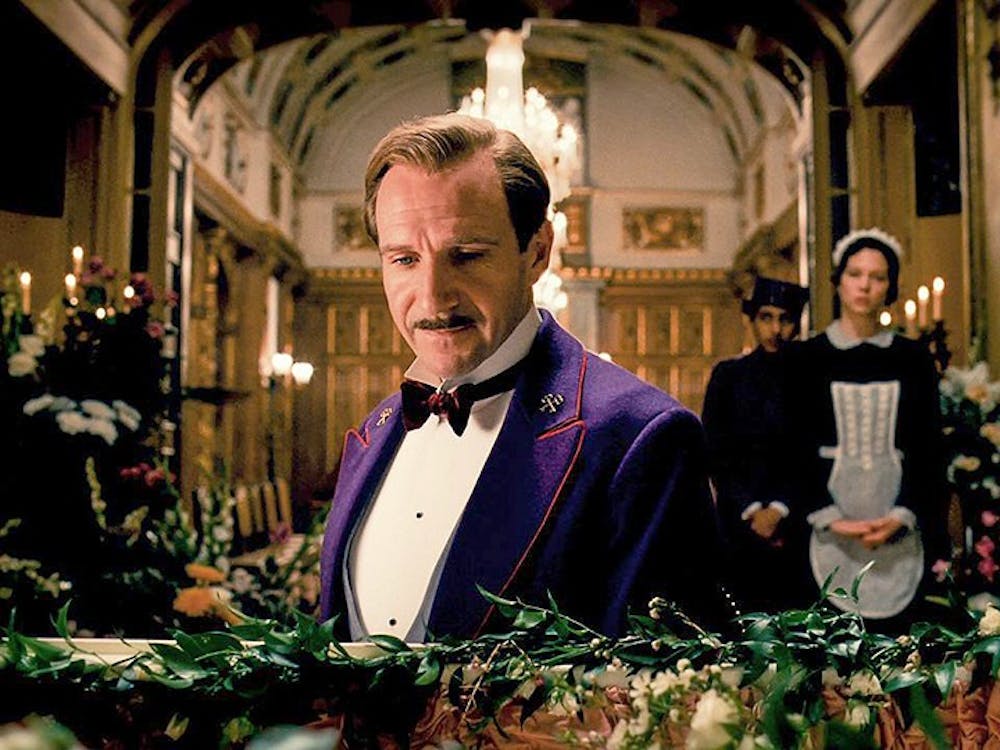Comedic caper shows off distinctive style with ample charm, intricate story, set design
Wes Anderson’s eighth feature film is distinctly his own, featuring a narrative as intricately crafted as the film’s visual design.
The film is told through a number of framing stories within framing stories, serving to bridge the film together as a narrative and as a combination of set design, locations and camera movement.
The film begins in the present, as a young girl goes to a cemetery reading a book by an author (Tom Wilkinson) who then talks to the camera in the 1980s about his experience of visiting the Grand Budapest Hotel in 1968. At the time of his visit in the late ’60s (the author in his youth being played by Jude Law), the hotel’s popularity has fallen, and barely a soul occupies the once-thriving establishment.
He meets a gentleman who seems pleasant but with a world-worn face and a sadness in his eyes. Through the course of conversation and food, the young author finds out this older man, Monsieur Zero Moustafa (F. Murray Abraham), is the owner of the massive hotel.
The Grand Budapest has been a part of his life for many years because when he was a young boy, he was an immigrant fleeing World War I and then a lobby boy at the luxurious retreat (played in his youth by Tony Revolori). He was personally mentored by perhaps the hotel’s grandest concierge, the utterly dedicated, devoted M. Gustave (Ralph Fiennes). The majority of the film takes place in the 1930s in the fictional European country of Zubrowka.
Gustave ran the hotel as smoothly and flawlessly as Anderson directs this intricate, delicate effort, but he’s not the perfect businessman. With his pencil-line mustache, perfectly slicked hair and a devilish shine in his eyes, Gustave beds his elderly female acquaintances for their money, à la Max Bialystock in “The Producers.”
The main action of the film begins when Madame D., one of his wealthy, withered women, ends up murdered in her mansion where a priceless painting was stolen, and the delectable lady-killer is accused of the crime. The film turns into a madcap mix of a chase film, a prison escape film, whodunit, romance and sly political satire.
Anderson is one of those filmmakers, like Tim Burton and Terrence Malick, whose style is so distinctive that one can see seconds from any of his films and tell it is his work. Every inch of the film is obsessively choreographed and designed. The storybook quality makes the viewing experience incredibly delightful and joyous. Look anywhere in the frame to find a hidden gag in the set design or a delicately crafted prop.
The cast has about two dozen famous faces, many of whom have appeared in Anderson’s previous films, and many appear only minutes or seconds in the 100-minute film. In fact, it almost becomes distracting to have big-name actors pop up in the middle of the rapid-fire farce.
Ralph Fiennes is the star of the film, and he truly is the shining center that holds the film together beautifully. Known for his deeply serious dramas such as “Schindler’s List” and for playing villains such as Voldemort in the “Harry Potter” series, Fiennes is an incredibly gifted comic actor, just one who rarely gets to show off his funny side. The brilliant black comedy “In Bruges” is another rare taste of his marvelous comic chops. Gustave is at once collected and sure of himself and a bumbling fool who barely escapes arrest and death at every turn.
While the film, like nearly all of Anderson’s, is light and frothy, it does have a smidge of melancholy and real-world consequence. Not everyone makes it to the end. The rise of fascism surrounds the wild proceedings, making the inevitable next chapter of world history tragically clear.
“Fantastic Mr. Fox,” the stop-motion adaptation of Roald Dahl’s book, is still Anderson’s finest achievement, but everyone who cares about cinema, even those who are not usually fans of the director, should check out “The Grand Budapest Hotel” on the big screen.

